Toots Hibbert
Frederick Nathaniel "Toots" Hibbert, O.J. (born 8 December 1942) is a Jamaican singer and songwriter, known as the leader for the reggae and ska band Toots & the Maytals.
The Honourable Toots Hibbert | |
|---|---|
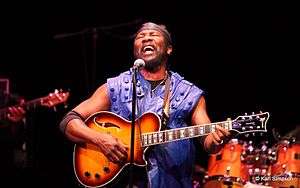 Toots Hibbert performing with Toots & the Maytals in Orlando, Florida | |
| Background information | |
| Birth name | Frederick Nathaniel Hibbert |
| Born | December 8, 1942 May Pen, Jamaica |
| Origin | Kingston, Jamaica |
| Genres | Ska, rocksteady, reggae, roots reggae |
| Occupation(s) | Musician, songwriter, bandleader |
| Instruments | Vocals, guitar |
| Associated acts | Toots & the Maytals |
Early life
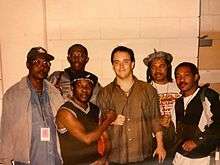
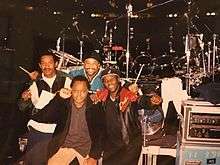
Hibbert was born in May Pen, Parish of Clarendon, Jamaica, the youngest of seven children. He is not related to Joseph Hibbert, a founder of Rastafarianism. Hibbert's parents were both Seventh-day Adventist preachers, and he grew up singing gospel music in a church choir, which influenced his singing. At age 13, Hibbert moved to the Trenchtown neighborhood of Kingston as a teenager in the early 1960s, and formed the Maytals, with Ralphus "Raleigh" Gordon and Nathaniel "Jerry" Matthias. The Maytals were named after Hibbert's hometown of May Pen.[1]
Career
The Maytals became one of the more popular vocal groups in Jamaica in the 1960s, recording with producers Coxsone Dodd, Prince Buster, Byron Lee, Ronnie Nasralla, and Leslie Kong. This success included winning Jamaica's National Popular Song Contest three times with songs Hibbert wrote: in 1966 with "Bam Bam", 1969 with "Sweet and Dandy" and 1972 with "Pomps & Pride".[2]
In 1966, Hibbert was sentenced to 18 months in prison for possession of marijuana.[3] This experience provided the inspiration for one of his best known songs, "54-46 That's My Number".[3]
Hibbert was one of the first artists to use the word "reggae", in 1968's "Do the Reggay".
Excerpt from "The Rise of Reggae and the influence of Toots and the Maytals" by Matthew Sherman:[4]
In the winter of 1968, the cool rocksteady beat gave way to a faster, brighter, more danceable sound. Reggae was born. Toots heralded the new sound with the seminal, complex groove monster "Do the Reggay" advertising "the new dance, going around the town." Toots wanted "to do the Reggae, with you!" …From '69 to '71, Toots could do no wrong recording for Leslie Kong. With the consistent nucleus of musicians, the Beverley’s All-Stars (Jackie Jackson, Winston Wright, Hux Brown, Rad Bryan, Paul Douglas and Winston Grennan) and The Maytals’ brilliant harmonizing, Toots wrote and sang his unmistakable voice about every subject imaginable.[4]
The first Toots and the Maytals album released and distributed by Chris Blackwell's Island Records was Funky Kingston. Music critic Lester Bangs described the album in Stereo Review as "perfection, the most exciting and diversified set of reggae tunes by a single artist yet released."[5] Chris Blackwell had a strong commitment to Toots and the Maytals, saying "I've known Toots longer than anybody – much longer than Bob (Bob Marley). Toots is one of the purest human beings I've met in my life, pure almost to a fault."[6]
Hibbert also appeared in the groundbreaking Jamaican film The Harder They Come. The film's soundtrack included the Maytals' 1969 hit song "Pressure Drop".
— Christgau's Record Guide: Rock Albums of the Seventies (1981)[7]
On 1 October 1975, Toots and the Maytals were broadcast live on KMET-FM as they performed at the Roxy Theatre in Los Angeles. This broadcast was re-mastered and released as an album entitled Sailin' On via Klondike Records.[8]
Much of Hibbert's recorded output reflects his Christian upbringing. Hibbert has been known to write about Rastafarian religious themes as well, and in an early Maytals song, Six And Seven Books of Moses from 1963, he addressed the folk magic of obeah and its use of the occult literature of Biblical grimoires, such as the Sixth and Seventh Books of Moses.
A multi-instrumentalist, Hibbert can play every instrument used in his band.[9] He has mentioned Otis Redding, Ray Charles, Wilson Pickett, and James Brown as influences.[1]
21st century
Hibbert still tours the world, and his band won the Grammy Award for best reggae album in 2004.
In 2005, Willie Nelson released a reggae album entitled Countryman which featured Hibbert on the song "I'm a Worried Man".[10] Hibbert was also featured in the music video for Nelson "I'm a Worried Man", which was filmed in Jamaica.[11]
In 2006, Toots & the Maytals covered Radiohead's "Let Down" for the Easy Star All-Stars album Radiodread, a reggae version of the English rock band's OK Computer.
In 2007, Hibbert was featured in the concert video release of Willie Nelson and Friends - Outlaws & Angels.[12][13]
In 2009, Hibbert collaborated with Malik Al Nasir and Steel Pulse's Sidney Mills, who produced Jamaican percussionist Larry McDonald's album Drumquestra. His track is called "What about the Children?", a house track with accompanying video shot on location in New York. The same year he also performed vocals with Iowa reggae band Public Property on their album Work to Do.
Hibbert was also a judge for the 10th annual Independent Music Awards to support independent artists' careers.[14]
Hibbert collaborated with the US southern rock/blues group, JJ Grey & MOFRO. He is featured in their song, "The Sweetest Thing", on their album, Georgia Warhorse.
In 2011, Hibbert was featured in the documentary “Reggae Got Soul: The Story of Toots and the Maytals” which was featured on BBC.[15] Described as “The untold story of one of the most influential artists ever to come out of Jamaica”, it features appearances by Marcia Griffiths, Jimmy Cliff, Bonnie Raitt, Eric Clapton, Keith Richards, Willie Nelson, Anthony DeCurtis, Ziggy Marley, Chris Blackwell, Paolo Nutini, Paul Douglas, Sly Dunbar and Robbie Shakespeare.[16][17]
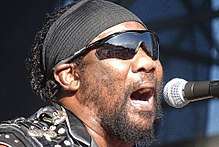
Hibbert joined the Red Hot Chili Peppers for a performance of "Louie Louie" during their New Year's Eve performance on 31 December 2011 held in St. Barts by Russian billionaire, Roman Abramovich. Around 300 guests including George Lucas, Martha Stewart, Marc Jacobs and Jimmy Buffett attended the party at Abramovich's million estate.[18]
In May 2013, Hibbert received a head injury after being hit by a thrown bottle during a performance at the River Rock Festival in Richmond, Virginia, US, forcing him to cancel several months of live shows.[19] The bottle was thrown by William C Lewis. Lewis was facing a charge of malicious wounding, but he pleaded guilty to lesser charges. Despite Hibbert pleading in a letter to the judge, "He is a young man, and I have heard what happens to young men in jail. My own pain and suffering would be increased substantially knowing that this young man would face that prospect," the judge gave Lewis a six-month sentence.[20]
After a three-year hiatus following the incident at the River Rock Festival, in 2016 Toots and the Maytals returned to the stage and began touring again.[21]
On 25 July 2018, Hibbert performed on the US television show The Tonight Show Starring Jimmy Fallon with Toots and the Maytals where they debuted an original song entitled "Marley" as well as performing their classic hit song "Funky Kingston" in a live performance.[22]
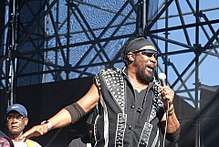
Toots and the Maytals have been cited as inspiration for other music artists when it comes to career longevity. Jamaican artist Sean Paul explains this by saying, “I’ve seen some great people in my industry, you know, people like Toots…Toots and the Maytals. Toots, he’s a great reggae artist and he’s still doing it…He’s up there in years and he’s doing it. Those kind of artists inspire me. I know I’m just going to keep on doing music as long as I can.”[23]
Hibbert provides uncredited vocals for the Major Lazer and Bad Royale collaboration, "My Number", which samples Hibbert's earlier song "54-46 That's My Number".
Honors
In 2010, Hibbert ranked #71 in Rolling Stone magazine's "100 Greatest Singers of All Time".[24]
In August 2012, it was announced that Hibbert would receive Jamaica's fifth highest honour, the Order of Jamaica.[25]
Partial discography
From Robert Christgau's "Consumer Guide" file:[26]
- Funky Kingston (Island, 1975)
- Reggae Got Soul (Island, 1976)
- Pass the Pipe (Mango, 1979)
- Just Like That (Mango, 1980)
- Toots Live (Mango, 1980)
- Reggae Greats: Toots and the Maytals (Mango, 1984)
- Toots in Memphis (Mango, 1988)
- Time Tough: The Anthology (Island, 1996)
References
- Marshall, Wayne (22 March 2020). "Toots and the Maytals: Funky Kingston". Pitchfork. Retrieved 23 April 2020.
- "Archived copy". Archived from the original on 15 October 2007. Retrieved 2008-02-10.CS1 maint: archived copy as title (link)
- "Singing the jailhouse rock", Jamaica Observer, 25 November 2012. Retrieved 25 November 2012
- Sherman, Matthew (18 September 2016). ""The Rise of Reggae and the Influence of Toots and the Maytals"". Debate.uvm.edu. Retrieved 2 February 2018.
- ""Toots and the Maytals." Contemporary Musicians". Encyclopedia.com. 6 October 2016. Retrieved 2 February 2018.
- "Red Bull Music Academy Daily". Daily.redbullmusicacademy.com. Retrieved 2 February 2018.
- Christgau, Robert (1981). "Consumer Guide '70s: T". Christgau's Record Guide: Rock Albums of the Seventies. Ticknor & Fields. ISBN 089919026X. Retrieved 16 March 2019 – via robertchristgau.com.
- "TOOTS AND THE MAYTALS - Sailin' On - Live At The Roxy Theater LA 1975 (CD)". Odmcy.com. Retrieved 2 February 2018.
- Album sleeve of DJ Derek Presents… Sweet Memory Sounds (2006).
- "Willie Nelson: Countryman Album Review - Pitchfork". Pitchfork.com. Retrieved 2 February 2018.
- ""Willie Nelson - I'm A Worried Man Ft. Toots Hibbert"". YouTube. 11 August 2011. Retrieved 2 February 2018.
Music video by Willie Nelson performing I'm A Worried Man
- "Willie Nelson and Friends - Outlaws & Angels". Amazon.com. 19 October 2004. Retrieved 2 February 2018.
- "Willie Nelson & Friends* - Outlaws And Angels". Discogs.com. Retrieved 2 February 2018.
- "Independent Music Awards". Independent Music Awards. Archived from the original on 13 July 2011. Retrieved 19 August 2014.
- "Toots and the Maytals: Reggae Got Soul - BBC Four". BBC. Retrieved 2 February 2018.
- "Toots & The Maytals - Reggae Got Soul - Documentary Trailer". YouTube. 15 August 2013. Retrieved 2 February 2018.
- "Honolulu Museum of Art : Toots and the Maytals: Reggae Got Soul". Honolulumuseum.org. Retrieved 2 February 2018.
- "Red-hot party | Page Six". Nypost.com. 2 January 2012. Retrieved 19 August 2014.
- "'Time Will Tell' Says Toots", Jamaica Gleaner, 13 October 2013. Retrieved 13 October 2013
- "Man gets jail time despite "Toots" Hibbert's plea – Richmond Times-Dispatch: Crime News". Timesdispatch.com. 13 December 2013. Retrieved 19 August 2014.
- "Toots And The Maytals Announce First Tour In 3 Years". jambase.com. 13 April 2016. Retrieved 29 June 2016.
- Tornow, Sam (26 July 2018). "Reggae Originators Toots and the Maytals Take Over 'Tonight Show' With 'Funky Kingston & Marley'". Billboard.
- Breakfast Club Power 105.1 FM (21 November 2016). "Sean Paul On Eating Pum Pum, Being Jamaican, Other Artist Releasing Caribbean Music + New Music". YouTube. Retrieved 2 February 2018.
- "100 Greatest Singers of All Time". rollingstone.com. Retrieved 6 August 2018.
- Bonitto, Brian (2012) "Tosh gets OM", Jamaica Observer, 7 August 2012, retrieved 7 August 2012
- "CG: Artist 1612". robertchristgau.com. Retrieved 16 March 2019.
External links
| Wikimedia Commons has media related to Toots Hibbert. |